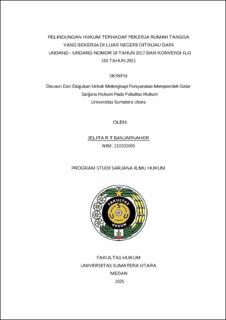Pelindungan Hukum terhadap Pekerja Rumah Tangga yang Bekerja di Luar Negeri Ditinjau dari Undang - Undang Nomor 18 Tahun 2017 dan Konvensi ILO 189 Tahun 2011
Legal Protection of Household Workers Working Overseas Reviewed from Undergoing Number 18 Year 2017 and ILO Convention 189 Year 2011

Date
2025Author
Banjarnahor, Jelita R T
Advisor(s)
Agusmidah
Ningsih, Suria
Metadata
Show full item recordAbstract
Legal protection as the protection of dignity and recognition of human rights owned by legal subjects in a legal state based on applicable legal provisions, both preventive and repressive. This research discusses the scope related to domestic workers who work abroad, and focuses on legal protection for domestic workers. Domestic workers often adapt to various problems. The problems faced by domestic workers include unfair treatment, low wages, delays in payment of wages, violence in the workplace, and work that is not in accordance with the work contract. Data from the Indonesian Migrant Workers Union (SBMI) shows that between 2010 and 2025, there were 5,664 cases of domestic workers' rights violations handled. As a country of law that respects human rights, the Indonesian government is expected to support ILO Convention 189 on decent work for domestic workers. However, to date, there is no law that specifically regulates the protection of domestic workers, both domestically and those working abroad. This makes domestic workers vulnerable to exploitation and human rights violations.
The research method used in writing this thesis is the normative juridical research method using a statutory approach, and strengthened by an interview approach conducted at BP2MI and PT Wira Usaha Kreasi. This research is descriptive analytical in nature that uses laws and regulations related to legal theories that are the object of research or regulations related to the object of research. The data collection tools used are document studies or literature studies, namely searching for data from books, laws and regulations, journals, scientific papers, and strengthened with supporting data, namely interviews. The results of this study found that while domestic workers are considered as much-needed workers, they do not have adequate legal protection. Currently, there is no specific law that regulates the protection of domestic workers, who work outside. This research emphasises the importance of government support in legalising and protecting the rights of domestic workers, through the passage of the Domestic Workers Bill in accordance with ILO Convention 189 on Decent Work. The government is expected to provide better social security and legal protection for domestic workers.
Collections
- Undergraduate Theses [3141]
